What has changed for Suffolk's energy infrastructure under Labour?
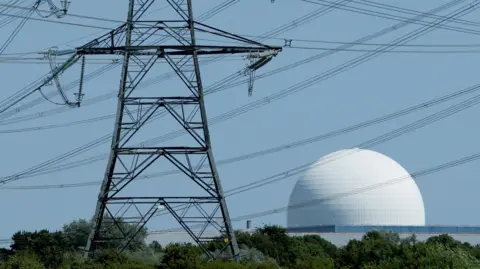 Reuters
Reuters"Build baby build", said Prime Minister Sir Keir Starmer in February while talking about energy infrastructure.
A year on from Labour winning the general election on 4 July 2024, what decisions have ministers made on energy projects planned for Suffolk?
Billions for Sizewell C
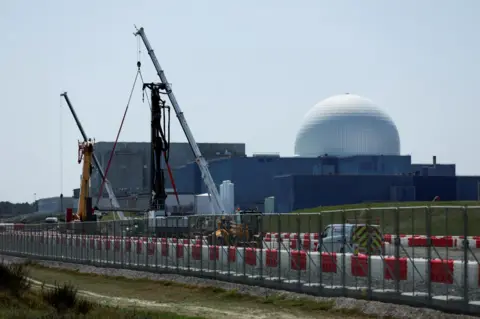 Reuters
ReutersNew nuclear power has been a big part of Labour's plans for energy generation, the government has backed small nuclear reactors and pledged huge amounts of money towards a major nuclear power station on the Suffolk coast.
Sizewell C nuclear plant gets £14bn go-ahead from government
Chancellor Rachel Reeves said the "landmark decision" would "kickstart" economic growth, while Energy Secretary Ed Miliband said the investment was necessary to usher in a "golden age of clean energy".
It is still not enough to actually build Sizewell C. Private investment is being sought, with a final decision expected this year.
Opposition campaigners have condemned the government's use of public money to fund the project.
Alison Downes from Stop Sizewell C said: "There still appears to be no final investment decision for Sizewell C but £14.2bn in taxpayers' funding, a decision we condemn and firmly believe the government will come to regret."
Early solar decision
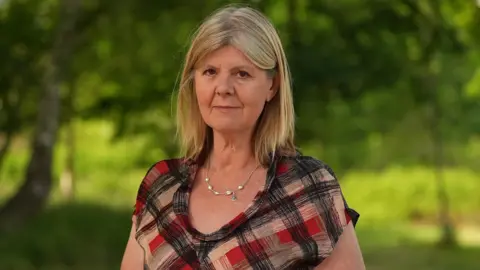 Martin Giles/BBC
Martin Giles/BBCOne of the first major decisions taken by Labour was giving the green light to the Sunnica solar farm.
The £600m energy farm is set to be 2,500 acres (1,012 hectares) and spread across three separate sites on the Cambridgeshire-Suffolk border.
The Conservative government had delayed making a planning decision on the project numerous times.
Secretary of State for Energy Security Ed Miliband approved the plans just over a week after the election.
He said: "Some of these cases had been held up for months before I arrived in the department.
"They were put on my desk on Monday and I've made a decision in three days."
It was controversial. Some locals said they were "shell-shocked".
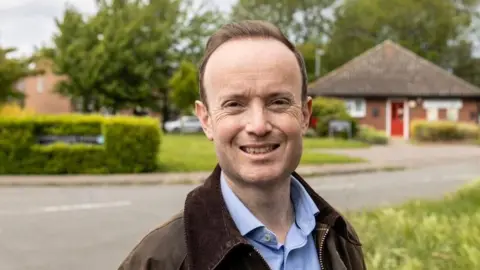 Jo Thewlis/BBC
Jo Thewlis/BBCConservative Richard Rout, who is in charge of nationally significant infrastructure projects at Suffolk County Council, said the government was "going for pace over everything else".
He said there had been a "rush" of solar projects pitched for Suffolk.
On government plans for planning reform, Rout said: "I'm afraid the Suffolk countryside will see more pylons and more solar farms as a result."
The government's solar roadmap sets out plans to increase how large solar farms can be before they have to be considered nationally significant infrastructure projects, which the government said could end up "potentially, resulting in faster and cheaper consenting".
Offshore power, onshore problems
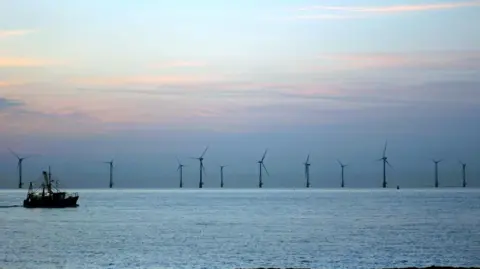 PA Media
PA MediaMore than a hundred wind turbines are already operating off Suffolk's coast, with approval granted to build more.
There are not many objections to offshore wind, but the way the energy is brought onshore upsets some.
Cables land on beaches and stretch to converter and substations, which are large industrial sites.
One substation, planned for the village of Friston, has seen considerable opposition.
There have been calls for an offshore power network to be built at sea, which would save the need for onshore infrastructure, however the government has so far not shown any interest.
Meanwhile plans for undersea cables connecting the Suffolk coast to the Netherlands and Kent are progressing.
Lionlink and Sea Link have local opposition as it would see onshore infrastructure built to connect to the power grid.
112 miles of pylons
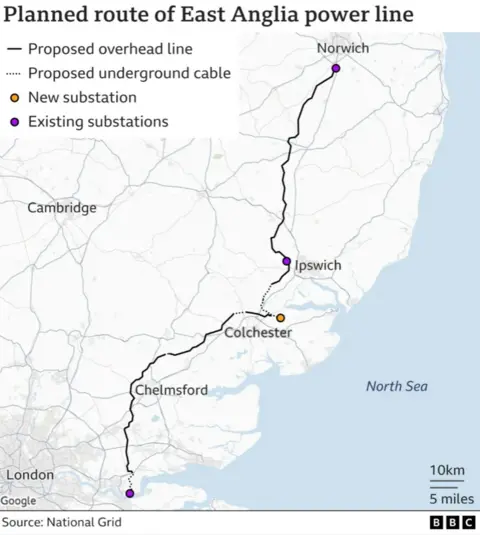
Another controversial energy project is the Norwich to Tilbury pylon plan.
It would see energy pylons and underground cables running from Norfolk, through Suffolk to Essex.
Jerome Mayhew, the Conservative MP for Broadland and Fakenham, said plans to build more than 100 miles (161km) of pylons was "ideological madness".
There has been support from senior Labour figures, with the chancellor previously saying it was "time to get on with it".
There have been calls to move the infrastructure out to sea or bury more underground.
The Labour MP for Lowestoft Jess Asato said she believed pylons were the best idea.
She said of calls for more underground cables: "We are talking about huge tunnels bored into the ground and a lot of loss of biodiversity."
 Ipswich Labour
Ipswich LabourA spokesperson for the Department for Energy Security and Net Zero said: "Through our sprint to clean power, we will get off the rollercoaster of fossil fuel markets, protecting business and household finances with clean, homegrown energy that we control.
"Decisions we have made over the past year have laid strong foundations to achieve this as we ramp up clean power in the coming years.
"This includes delivering the most significant investment in clean, homegrown power in history, consenting nearly 3GW of nationally significant solar projects, ushering in a new golden age of nuclear power, including £14.2 billion to fund the construction of Sizewell C and setting up the publicly owned Great British Energy."
Labour MP for Ipswich Jack Abbott criticised the previous Conservative government and blamed high energy bills on a lack of investment.
He said: "We do need new nuclear power stations like Sizewell C, yes we need solar and offshore and onshore wind.
"These are crucial long-term investments but investments that will see immediate returns."
Follow Suffolk news on BBC Sounds, Facebook, Instagram and X.
